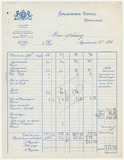Walter Mehring
Sie wissen wie das aussieht, wenn man als Emigrant statt als Cook-Europäer kommt. Und dann sitze ich mit eigenen Sorgen: meine Mutter in Berlin, zum Auswandern aus diesem gar nicht mehr existierenden Lande nicht zu bewegen (nach der Haussuchung nicht einmal).
[You can imagine what it looks like if you come as an emigrant rather than as a Cook-European. And I sit there with own worries: my mother in Berlin, impossible to convince her to emigrate from this country that no longer exists (not even after the house search). (ed. trans.)]
Walter Mehring in Paris to Kurt Tucholsky, 1933
| Born | on 29 April 1896 in Berlin, Germany in Berlin, Germany |
|---|---|
| Died | on 3 October 1981 in Zurich, Switzerland in Zurich, Switzerland |
| Exile | Austria, Switzerland, France, United States of America |
| Remigration | Federal Republic of Germany |
| Profession | Poet, Writer |
After starting out in Dadaism, Walter Mehring rose at the beginning of the 1920s to become one of the most popular cabaret, song and lyric writers in Berlin. His lyrics were set to music, his satirical songs and chansons recited and sung on the famous stages. In 1927 his Erwin Piscator-staged play Der Kaufmann von Berlin was the subject of a theatrical scandal: the performance was interrupted by the SA rampaging in the theatre. Until 1933 Mehring, who was not affiliated to any party or ideology, had been one of the sharpest and most biting and mocking critics of the emerging Third Reich.
On 26 February 1933, Walter Mehring fled to Paris after being tipped off about his impending arrest. Later in his exile, Mehring again avoided being arrested by the Gestapo several times at the last moment, such as in March 1938 during the Anschluss of Austria, during the invasion of German troops in France in June 1940 and during his escape from Marseilles in February 1941.
Until mid-1938 Mehring was one of the main contributors to Leopold Schwarzschild's exile magazine Das Neue Tage-Buch. His exile work is marked by bitter, satirical mockery, but also by his personal experiences of exile. Mehring published two more volumes of poetry and two novels before 1945.
In the United States, he was given a one-year screenwriting contract by the MGM Studios in Hollywood, before moving to New York in 1942. There his financial fortunes worsened dramatically. In 1953, Walter Mehring returned to Europe. He lived in Ascona, Zurich and Munich, among other places.
Selection of important works:
Das Ketzerbrevier. Ein Kabarettprogramm (Gedichte und Lieder, 1921)
Der Kaufmann von Berlin. Ein historisches Schauspiel aus der deutschen Inflation (Drama, 1927)
Müller. Chronik einer deutschen Sippe (Roman, 1935)
No Road Back – Kein Weg zurück (Gedichte, 1944)
Die verlorene Bibliothek. Autobiographie einer Kultur (1952)
Further reading:
Pauli, Hertha: Der Riss der Zeit geht durch mein Herz. Ein Erlebnisbuch. Wien und Hamburg: Paul Zsolnay Verlag 1970.
Schulz, Georg-Michael: Walter Mehring. Hannover: Wehrhahn Verlag 2013.
Buchwald, Christoph (Hrsg.): Walter Mehring Werke. Düsseldorf: Claassen Verlag 1978ff.





